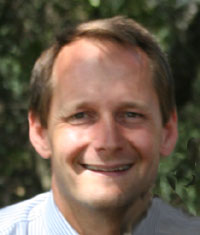Keeping Science in Perspective
By Fritz Hinrichs
Printed in Practical Homeschooling #16, 1997.
 Fritz Hinrichs thinks learning the history of science is important, because it teaches us that scientists make mistakes, too.
Fritz Hinrichs thinks learning the history of science is important, because it teaches us that scientists make mistakes, too.

|
 |
 When teaching science, it is important to remember that science did not arise out of a vacuum, for it has a history of its own. When we teach science without historical context, we set it up as a dogma that can easily usurp the place of other valid authorities. Students need to develop the computational skills that scientific proficiency requires; however, emphasizing the history of science will keep your science program from having too narrow a focus. The history of science has been a rocky and often embarrassing saga, though this is not the impression you will get using many modern textbooks; these content themselves with simply summarizing the theories that are currently most widely accepted.
When teaching science, it is important to remember that science did not arise out of a vacuum, for it has a history of its own. When we teach science without historical context, we set it up as a dogma that can easily usurp the place of other valid authorities. Students need to develop the computational skills that scientific proficiency requires; however, emphasizing the history of science will keep your science program from having too narrow a focus. The history of science has been a rocky and often embarrassing saga, though this is not the impression you will get using many modern textbooks; these content themselves with simply summarizing the theories that are currently most widely accepted.
The Astronomical Odyssey of Discovery
One of the great sagas in the development of science is astronomy. Astronomy has such a long history because the instruments associated with its study are fairly simple. If you would like to add a segment to your curriculum to help your student understand this saga, start with Ptolemy's Almagest. Ptolemy, a first century Alexandrian mathematician and astronomer, put forward in his Almagest a system of astronomy that was widely held for more than 1600 years. What is so fascinating about Ptolemy's geocentric system is that he was able to build a coherent mathematical system to explain the observations that could be made with the instruments of his day. It was not until Tycho Brahe, a 16th-century Danishman who combined the inquisitiveness of an astronomer with the know-how of a craftsman, that the instruments used in astronomy were improved to the point that they could conclusively show the inaccuracies in the Ptolemaic system.
Given this new level of precision in the astronomical observations, Copernicus was able to set forth a mathematical system using the heliocentric model that was much more accurate than that of Ptolemy. Even though Copernicus abandoned the heliocentric view, he still held, as Ptolemy did, that the planetary orbits were circular rather than elliptical. It would take Johannes Kepler, and finally, Isaac Newton in his Principia Mathematica to fully show the advantages of employing elliptical rather than circular motion to describe the orbits. Selections from the writings of Ptolemy, Copernicus and Kepler are contained in volume 16 of Great Books of the Western World from Encyclopaedia Britannica (ISBN 0-85229-163-9). Newton's Principia Mathematica is published by the University of California Press (ISBN 0-520-00927-4).
Another great saga in the development of science is the field of anatomy; specifically the understanding of the circulatory system. Galen, the great second century Roman physician, understood the liver to be the actual source of blood which then flooded outward to the body's extremities. It was not until William Harvey published The Circulation of the Blood in 1628 that this view was replaced with the understanding that the blood actually returns from the extremities to the heart to be reused. Harvey's The Circulation of the Blood is available from the Everyman's Library (ISBN 0-460-01262-2), and Harvey's and Galen's writings are available in the set, Great Books of the Western World, previously mentioned.
Enshrining Science
As modern citizens, we are quick to dismiss the scientific endeavors of previous generations as just so much muddle-headed nonsense; however, seeing the mistakes of the past shows us the pitfalls that can be the undoing of our own theories. Each generation attempts to reconcile its most precise observations with consistent and universal mathematical principles.
Modern science has done much to enshrine itself as a "dogmatism of the present." This confidence is the grandchild of the Enlightenment's brave assertions regarding the efficacy of "objective reason." In order to get a good taste of this confidence in the new scientific method, read Francis Bacon's The New Organon (1620) (ISBN 0-672-60289-X). The German philosopher Immanuel Kant also contributed to modern man's tremendous confidence in his own scientific powers by declaring that scientific and mathematical laws are not distillations of consistencies seen in an "external" reality, but merely products of the mind's own ordering of our sense experience. In Kant's view, man need be troubled no longer with the suspicion that he has misinterpreted something outside himself.
This great confidence in science has not been able to bear the weight of it own presumptuousness. Even modern secular prophets have come to acknowledge the tenuous nature of the hold that scientific theories can maintain over the human mind. In The Structure of Scientific Revolutions, Thomas Kuhn clearly demonstrates this progression from one scientific paradigm to the next using a number of telling historical examples. The challenge for modern man will be whether he can face up to the mortality of his scientific idol without racing to the opposite extreme of mindless relativism. Given a few generations fed upon the touchy-feely math and science programs that are currently the rage in most educational circles, you can be sure future students will have no experience in their own educational background from which they might develop a faith in the existence of universal scientific laws.
Our goal should be to teach a humble science. Not one that would lead to an inordinate presumption regarding its own claims, but neither one that does not have the courage to rise up and unify the often confusing experience that is the world around us. An education that will promote such a balanced view of science will not only teach it as a set of given computational procedures to be mastered in order to come to correct answers, but also as a field with a tumultuous history of its own, that will never stop developing until man ceases the process of observation and reflection. Humble science will not parade about as an end in itself rewarding absolute knowledge to its epistemologically greedy devotees, but will point us beyond itself to the One whose nature we are delighted to plumb by studying His mysterious yet comprehensible creation.